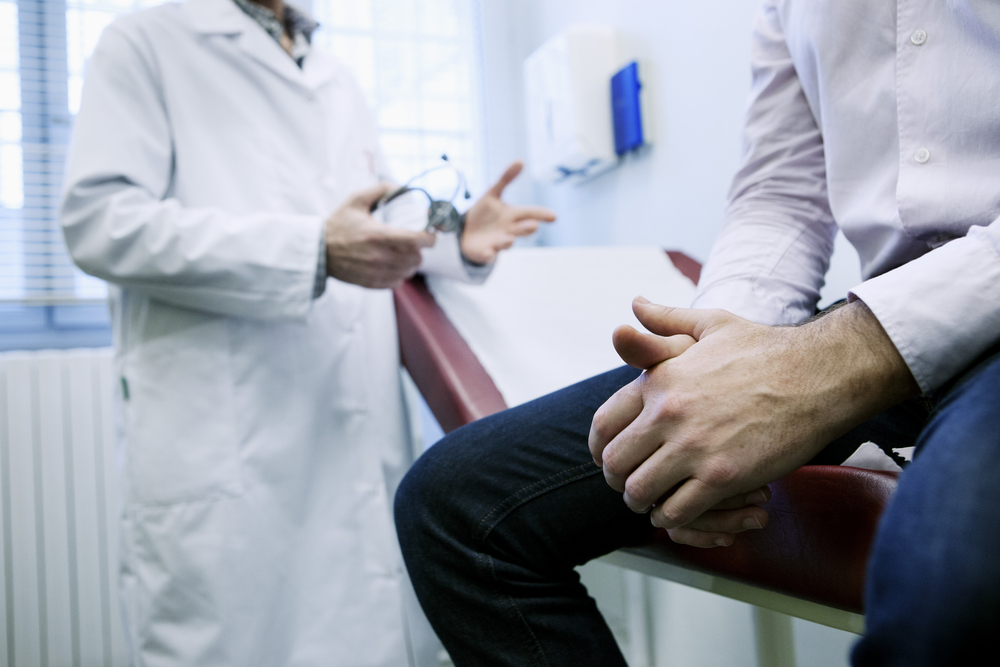- Age is the most significant risk factor for cancer, and the median age for a cancer diagnosis is 66 years old.
- While cancer in kids, teens, and young adults is pretty rare, there are at least 10 different forms of cancer that are on the rise in young people.
- Doctors suspect that lifestyle factors like poor diets and extra body fat may play a key role in fueling some of these cancers, which include colon, kidney, and pancreas cases.
- Visit Insider’s homepage for more stories.
Make no mistake about it, age is still the number one risk factor for developing cancer. The median age for a cancer diagnosis in the US today is 66 years old. Usually, cancer hits older folks hardest, as cells age and sustain more cancer-causing DNA damage. But not always.
According to the American Cancer Society, fewer than 1 in 100 cancer cases diagnosed every year are in children. Likewise, in the UK fewer than 1% of all cancer cases occur in people under 24 years old.
Still, instances of certain cancers are going up at an alarming rate among kids, teens, and young adults, and doctors are worried that these diseases could prompt even more health troubles as they age. Here’s what oncologists have on their radar.
Childhood cancers are a far greater mystery to science than the kinds that adults get.

Most childhood cancers cannot be prevented or screened for, according to the World Health Organization, and very few cancers in kids are prompted by environmental or lifestyle factors.
Scientists suspect that around 1 in 10 childhood cancers may stem from genetics, and say the best defense against childhood cancer is early diagnosis and treatment.
Survival rates for childhood cancers are much better in high-income countries, at about 80%, compared with just 20% in many low- and middle-income spots where it's more difficult to get adequate treatment.
Even though the fraction of cancer cases that kids get is tiny, there are certain diagnoses that are on the rise, even in babies.

In the 25 years from 1988 to 2012, hepoblastoma cases soared in tots from 0 to 4 years old.
Cases of leukemia, neuroblastoma, and ependymal tumors are also increasing in babies and toddlers, according to research released by the University of Minnesota in April.
Hepoblastoma is a rare form of cancer that starts in the liver. It doesn't usually spread to other parts of the body.

"While our research suggests hepatoblastoma is the fastest rising cancer in children under five, this is still a very rare cancer. This finding should not be concerning to parents," lead study author Jenny Poynter said in a statement when her find was published in the journal JNCI Cancer Spectrum.
Hepoblastoma cases in the 0 to 4 age group have been on the rise in every region of the world except south Asia since the late 1980s, with diagnoses up roughly 2 to 6.5% every year, depending on the region.
Kids with cancer who are successfully treated don’t emerge worry-free from future diseases, either. Childhood cancer survivors are at a heightened risk of developing health issues later in life, like heart disease.

Childhood cancer survivors have up to a tenfold increased risk for heart failure, when compared to their peers who've never had cancer.
Part of the problem may be the life-saving chemotherapy treatments that many cancer patients undergo, which can "prematurely age the heart and accelerate the development of heart disease," according to recent research published by the American Heart Association.
Diabetes and hypertension cases also seem to be more common in kids who've had cancer.
Vaccinating kids helps prevent certain types of cancer.

Contracting diseases early in life can increase a person's risk of developing cancer. For example, some viruses trigger genetic changes in cells that can contribute to cancer later on.
The recommended HPV vaccine and hepatitis shots combat future cases of cervical and liver cancer, respectively.
As with babies, teenage and young adult cancer cases are still pretty rare.

Most cancer cases in people under 30 "appear to be spontaneous" and not hereditary or environmental, a group of childhood cancer experts wrote in The Oncologist in 2006.
But some obesity-related cancer rates are soaring in young people, and doctors are worried it's a troubling sign of what's to come.

"It turns out that the fat tissue is a very active organ and it plays a very important role in storing and releasing energy," oncologist Neil Iyengar from Memorial Sloan Kettering Cancer Center told Insider. "When the fat tissue becomes dysfunctional in the setting of obesity, in the setting of hyper-adiposity (that's high levels of fat in a normal weight person) then that fat pad becomes ripe for the development of cancer."
Iyengar cautioned that even women who maintain a healthy weight can be at a greater risk for developing breast cancer, compared to their peers, if they have a high percentage of body fat, suggesting all poor diets can contribute to cancer risk, no matter how big or small a person may be.
Colon cancer rates are up sharply among young people, and cancer experts say poor diets may be to blame for some of those cases.

Early onset colorectal cancer is up significantly among people in their 30s and younger across many countries across the globe, including the US, UK, Australia, France, Ireland, Germany and at least eight other European countries.
Cases of colon cancer went up an average of up to 7.3% every year for people in their 30s in the UK from 2005 to 2014.
Compared to older adults, it's still a relatively low number of additional cases (267 more recorded in the UK in 2014 compared to 2005), but the rise is notable and alarming.
There's some evidence that eating more of certain foods, like turmeric, could help.

"It's probably, to the best of my knowledge, the most potent naturally occurring anti-inflammatory," Ajay Goel, a biophysicist who researches cancer, previously told Business Insider.
Over time, chronic inflammation can prompt the DNA damage that leads to cancer. Sugar, red and processed meat, refined carbs, as well as fried and processed foods are all inflammatory.
Goel said that "the kind of crap we eat every day" can play a huge role in colon cancer development. Cancer research UK also estimates that roughly 1 in 5 cases of colon cancer stems from processed and red meat consumption.
Dr Iyengar says one of the easiest and most effective ways to be kind to your gut is to feed it plants like veggies and whole grains.

"The colon has evolved to digest complex carbohydrates, which are contained in plants," Iyengar said. "We have a very long gut because of that. So you want to eat foods that have long processing time, to stay satiated. If you eat something that's refined, that's going to pass through your gut real quick and you're going to be hungry again and you're going to start taking in excess calories."
Endometrial cancer is on the rise in Americans from 25 to 49 years old too.

A study published in the Lancet in February pointed to the alarming rise in uterine cancer from 1995 to 2014, and suggested that "excess bodyweight could account for up to 60% of all endometrial cancers" in people over 30 years old.
Gallbladder cancer cases are also on an uptick.

The same Lancet study suggested excess bodyweight might contribute to 36% of gallbladder cancers in people over 30 years old.
"We're just eating too much," Goel said. Other cancer researchers are also studying how caloric restriction and intermittent fasting might be good for our long-term health.
In the US, kidney cancers in people from ages 25 to 29 also shot up 6.2% (on average) every year in the period from 1995 to 2014.

Kidney cancer is another obesity-related cancer.
Pancreas cancers are up in the US, and some of the sharpest gains are in 25 to 29 year olds.

Pancreatic cancer cases increased, on average, 4.3% for 25 to 29 year olds from 1995 to 2014.
Type-2 diabetes puts people at higher risk of developing this kind of cancer, and not only in the US.
"There is something going on here," Dr Iyengar said. "It's been hypothesized that in East Asia, as the Western diet becomes more prevalent, that might be contributing to the shifting pattern of presentation of various cancers there, obesity-related cancers."
Multiple myeloma, a plasma cell cancer that affects the immune system, is another obesity-related disease that's becoming more prevalent in the US.

Source: The Lancet
The risk of some of these obesity-related cancers to American millennials is twice what their parents (aka baby boomers) endured at the same age.

That's true for colorectal, uterine, pancreas, and gallbladder cancers.
Breast cancer is rare in young women, and breast cancer rates are declining overall, but there are some early indications that certain types may be on the rise.

"60 and above is still the most common age group to be diagnosed with breast cancer, but the incidence is slowly declining," Iyengar said. "The alarming thing is when you start to look at women in the age group of 30 to 34 and 20 to 29, while the rates of breast cancer are the lowest in this age group, the incidence is on the rise."
While breast cancer rates still remain relatively stable for young white and black women in the US, a nationwide study that examined more than 14 million cancer cases from 1995 to 2014 suggested that breast cancer diagnoses may be going up in young Asian and Asian-American women at startling rates, something that other researchers have noticed is true across generations of Asian-American women. Scientists still aren't sure why this is happening.
“Although the absolute risk of these cancers is small in younger adults, these findings have important public health implications,” American Cancer Society cancer epidemiologist Ahmedin Jemal said when his study was released suggesting that obesity-related cancers are on the rise in young adults across the US.

"The future burden of these cancers could worsen as younger cohorts age," he said.

